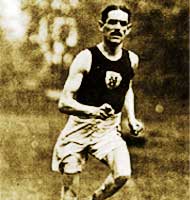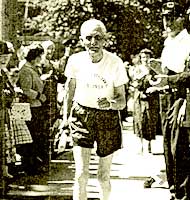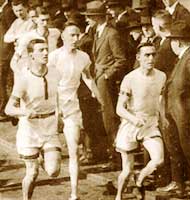ALFRED Shrubb learned much from the top coaches of his day (e.g. Harry Andrews), but was full of ideas and innovations himself and would subsequently prove a very good coach when his competitive days came to an end.
His first serious coaching work was at Boston’s famous Harvard University where he helped the college cross-country team to great success. At the time he was still making headlines with his own amazing exploits on the North American professional circuit, but knew his running days would soon be over. He didn’t fancy a conventional office job, and the idea of spending his days in the great outdoors in a sporting environment encouraged him to put all his energy into coaching.
He led Harvard to success in the prestigious inter-collegiate cross country championships and they became a force to be reckoned with around the period 1908-1911, under his command. This made good reading on Shrubb’s CV and was noted back in England. Despite the stigma of his life-time ban for contravening the official amateur code, he managed to land a top establishment job – he was hired to coach the Oxford University Athletics Club soon after the end of the 1914-18 war.
He brought his family back to England in 1919 to become the University’s very first paid sports coach and soon found himself working with some superb and precocious talent – including Olympians such as South African-born Bevil Rudd, Arthur Porritt , who would later become Governor General of New Zealand. Not to mention young Englishmen like Henry Stallard and Aubrey Montague, both of whom were among the the characters portrayed in the Oscar-winning feature film Chariots of Fire.
Shrubb led a combined Oxford and Cambridge University team across the Atlantic to the famous Penn Relays at Franklins Field, Philadelphia. His star-studded team rewarded their coach by breaking the world record for the 4 x 880 yards relay, an occasion that gave Shrubb as much pleasure as any other in his long career.
He coached Oxford throughout the 1920s, working with several athletes who competed at the 1920, 1924 and 1928 Olympic Games. Eventually things turned a little sour and Shrubb found himself struggling to inspire the young students to become high achievers in running. Many of them treated running in a relaxed manner and didn’t feel inclined to work hard at their training, an attitude which frustrated the dedicated Shrubb. He continued in his post despite other duties, which included the running of a hotel bar in Oxford, and public service as a city councillor. After an unfortunate episode which seems to have owed much to the class divide, Shrubb’s contract was cancelled in 1928.
It was an unfortunate way for his coaching career to end, for there can have been fewer better qualified people than Shrubb to pass on knowledge and experience on running matters.
His two coaching manuals, published around 1909, are still – nearly 100 years later – treated with reverential respect by aficionados. Copies are hard to come by and are valuable items to collectors. Even given all the changes in the sport since Shrubb’s day, these little books contain much advice that still makes sound sense today.Web Development by The Wire


